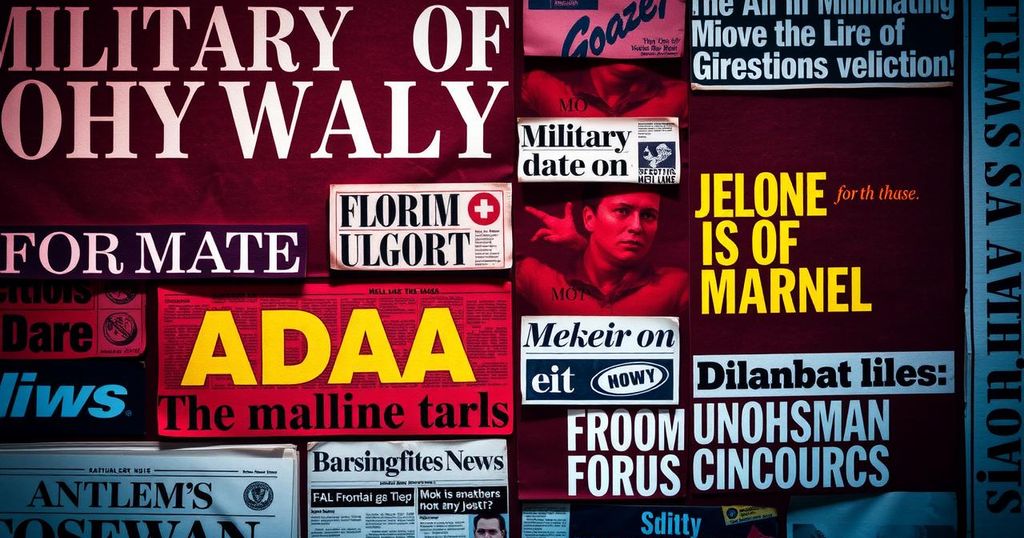Recent U.S. air strikes on Iran’s nuclear facilities, dubbed ‘Operation Midnight Hammer,’ are dominating headlines and eliciting mixed global responses. Iran threatens retaliation, casting uncertainty on future diplomatic relations. Publications vary in focus, with some warning of potential conflict escalation while others highlight calls for diplomacy.
In a dramatic twist to ongoing tensions in the Middle East, various publications are reflecting mixed sentiments regarding recent air strikes by the U.S. on Iran’s nuclear facilities. Described as “Operation Midnight Hammer,” the strikes targeted three key nuclear sites. President Trump maintains that the U.S. is not at war with Iran but rather with Iran’s nuclear program. The Financial Times contextualized this narrative, labeling the military action a “gamble” while emphasizing widespread fallout from the operation.
The Metro’s front page resonates with urgency, highlighting the “shock waves” resulting from the attack. Accompanying visuals display craters at the Fordo nuclear site, where U.S. forces utilized “bunker buster bombs.” Iranian officials have not taken this lightly, with Foreign Minister Mohammad Javad Zarif forewarning of “everlasting consequences” against the U.S.
Meanwhile, The Sun played off its historical headline from the Falklands War, proclaiming, “Stick it up your bunker.” The paper reflects on how world leaders are urging a diplomatic approach to de-escalation following the bombings, which it branded as a strike on a “terror state.”
Elsewhere, The Guardian warns that this may be the “most consequential intervention in a conflict in a generation,” pointing to remarks from Secretary of State Marco Rubio about impending vengeful reactions from Iran. The report suggests that this could embroil the U.S. in a protracted conflict—something Trump had previously vowed to avoid.
The Daily Telegraph echoes concerns about the shift in Trump’s stance, claiming he is now a “wartime leader,” having campaigned on reducing foreign commitments. It also mentions that Paris is seeking Unesco heritage recognition for house music, positioning this pursuit amid gravity of the military actions in Iran.
In a visually-driven piece, The Times foregrounds the geographical implications of the Fordo strike alongside a map detailing the underground complex. Iran’s parliament responded with a vote to potentially choke off the world’s oil supply by threatening to block the critically important Strait of Hormuz.
On the domestic front, the Daily Express highlighted the UK Prime Minister’s caution against escalating threats in the wake of U.S. intervention, while the Daily Mail expressed apprehensions about possible Iranian retaliation affecting the UK. Reports noted that Iranian activities in the UK are “substantial” and could potentially increase.
The Daily Mirror depicts Trump in a Make America Great Again cap and calls for calm amid fears of a conflict spiraling into a full-blown war. Meanwhile, the i Paper covers a Pentagon briefing revealing a timeline for Operation Midnight Hammer, emphasizing the risks posed to Middle East stability.
In stark contrast to the prevailing narratives, the Daily Star devotes minimal front-page space to the military action, instead choosing to lead with news about the Gallagher brothers’ family reunion, showcasing how diverse media priorities can be amid serious global crises.
As discussions continue around the implications of the air strikes, varying perspectives showcase the tension woven into the responses from political leaders and world citizens alike.
All eyes now turn towards Iran’s next move—and anticipations grow about the repercussions this military intervention could have on regional and global stability.
Overall, the reaction across various publications reflects a tense moment in international relations. While some media express hope for restraint, others predict retaliatory moves from Iran could escalate into a broader conflict. The complexity of the situation underscores the need for careful diplomacy moving forward, as leaders navigate an increasingly fraught geopolitical landscape.
Original Source: www.bbc.com






